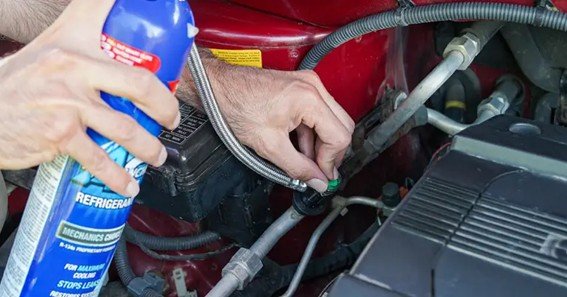If you’re experiencing diminished cooling performance in your vehicle, understanding and maintaining the car AC fluid—commonly known as refrigerant—is essential. This fluid plays a pivotal role in your car’s air conditioning system, ensuring optimal comfort during drives.
Understanding Car AC Fluid
Car AC fluid, or refrigerant, is a specialized gas that circulates through your vehicle’s air conditioning system. It absorbs heat from the cabin and releases it outside, thereby cooling the interior. Over time, refrigerant levels can decrease due to leaks or natural dissipation, leading to reduced cooling efficiency.
Types of Car AC Refrigerants
There are several types of refrigerants used in automotive AC systems:
- R-12 (Freon): Used in vehicles manufactured before 1995. Due to its ozone-depleting properties, it has been phased out and is no longer in production.
- R-134a: Introduced as a replacement for R-12, it’s been the standard for many vehicles produced between 1995 and the early 2010s.
- R-1234yf: A more environmentally friendly option with a lower global warming potential, now standard in many newer vehicles.
It’s crucial to use the correct type of refrigerant specified for your vehicle. Mixing different types can damage the AC system.
Signs Your Car’s AC Fluid Needs Attention
Recognizing the symptoms of low or degraded refrigerant can prevent further damage:
- Reduced Cooling Efficiency: If the air from the vents isn’t as cold as it used to be, it might indicate low refrigerant levels.
- Unusual Noises: Hissing or bubbling sounds can suggest a refrigerant leak.
- Visible Leaks: Oily spots under the vehicle might be refrigerant mixed with lubricant.
- AC Clutch Not Engaging: The AC compressor clutch may fail to engage if refrigerant levels are too low.
Recharging Your Car’s AC System
Recharging the AC system involves adding the appropriate type and amount of refrigerant. While DIY recharge kits are available, it’s essential to follow safety precautions and manufacturer guidelines. Incorrect handling can lead to overcharging or introducing air and moisture into the system, causing further issues.
For those unfamiliar with AC systems, seeking professional assistance is recommended to ensure proper recharging and to check for potential leaks or other underlying problems.
Maintenance Tips
- Regular Inspections: Have your AC system inspected annually to detect and address issues early.
- Use the AC Regularly: Running the AC periodically, even in colder months, keeps the system lubricated and prevents seals from drying out.
- Replace Cabin Air Filters: A clogged filter can reduce airflow and cooling efficiency.
- Monitor for Leaks: If you notice any signs of refrigerant leakage, address them promptly to prevent system damage.
FAQs
1. How often should I recharge my car’s AC system?
Typically, the AC system doesn’t require frequent recharging. If cooling performance diminishes, have the system checked for leaks or other issues before recharging.
2. Can I mix different types of refrigerants?
No. Mixing refrigerants can damage the AC system. Always use the type specified by the vehicle manufacturer.
3. Is it safe to use DIY recharge kits?
While DIY kits are available, incorrect usage can lead to overcharging or contamination. If unsure, consult a professional.
4. What causes refrigerant leaks?
Leaks can result from worn seals, damaged hoses, or corrosion. Regular inspections can help detect and address leaks early.
5. Does low refrigerant affect fuel efficiency?
Yes. An underperforming AC system can strain the engine, potentially reducing fuel efficiency.
Maintaining the correct level and type of car AC fluid is vital for optimal cooling performance and overall vehicle comfort. Regular inspections and timely maintenance can prevent costly repairs and ensure a pleasant driving experience.










